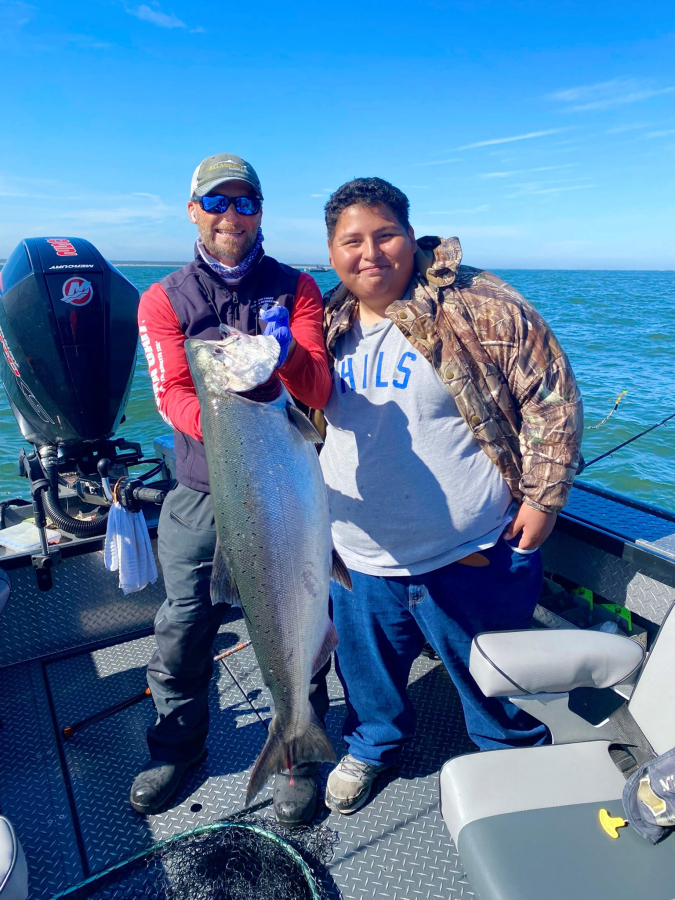
The biggest salmon fishery in the lower 48 states will kick off August 1, and with all the salmon and steelhead returns this year coming in well above the projections, hopes are very high.
There are some aspects of the run that will constrain fisheries, but overall expectations are for a very exciting season.
The total fall Chinook run into the Columbia is expected to be 485,500 adults, of which 230,400 should be the highly prized Upriver Brights.
Lower river wild tule Chinook are not expected to be strong, and that will constrain Chinook fisheries within Buoy 10, and the reach of the river up to the mouth of the Lewis River. The lions share of wild tules will be headed to that Washington tributary.
Close to a million coho are expected to arrive along the coast, and most of those are headed to the Columbia River.
Managers face a quandary with the strong run of coho, and low numbers of wild tules. The challenge will be allowing anglers to fish on the plentiful coho, while protecting the wild tule Chinook.
Ryan Lothrop, the Columbia River fishery manager for the WDFW, recently spoke about the unexpectedly high returns of other salmon to the river, and what that may mean for the Buoy 10 fishery.
“Of the fish that have returned that are the most like the fall Chinook, as to how they migrate, it would be the summer Chinook run,” Lothrop said. “That run came in above forecast.”
That’s a bit of an understatement, since the department expected about 57,000 adults, and at last count, almost 100,000 summer Chinook had crossed over Bonneville Dam.
While that gives anglers hope, the depressed wild tule run may keep fisheries managers from allowing any additional fishing days below the mouth of the Lewis River.
Bill Monroe Jr., of Bill Monroe Outdoors, is worried that anglers may keep too many tules in Buoy 10. Those fish contribute greatly to the Washington coast ocean salmon fisheries, and that fishery has been so good that managers had to close retention of Chinook in Marine Area 1, along the Long Beach peninsula because the catch rates were too high.
“All those early tules being caught along Long Beach is a good thing but also a problem.” said Monroe. “It’s really important that we stop the mortality of any kind of tules in Buoy 10, and not just wild tules.”
He explained that keeping the hatchery tules will also raise the mortality rate, and if the catch exceeds the mortality limits, the Chinook fishery could be shut down early.
Below Tongue Point, from August 1 through 24 the daily limit is two fish, of which one may be a hatchery adipose fin-clipped Chinook. From August 25 through September 7, anglers may keep two fish daily, only one of which may be a Chinook, fin-clipped or not. From September 8 through 30, the limit will be three hatchery coho, and no Chinook may be kept. For complete regulations, see the WDFW website.
Matt Eleazer of Eastfork Outfitters is excited about the prospects for the Buoy 10 season. However, he is concerned about the fact that the Chinook fishery will be mark-selective.
“I think it’s going to be an issue,” Eleazer said, “but that could also be a saving grace.”
He explained that ocean anglers were allowed any Chinook, marked or not, and that led to the heavy harvest that shut down the ocean Chinook season. With anglers looking for marked Chinook only, wild tules that are caught will be released.
Coho retention will also be limited to marked hatchery fish, but with the huge numbers of hatchery coho expected, the mark rate should not be an issue.
The fishing will probably be slow in early August, with the run building through the month. In fact, Eleazer will not fish it hard until mid-August.
Monroe will target the fishery in the salt, outside of the Buoy 10, when he can.
“I will be fishing outside if it’s safe and workable, and if not, I will be inside fishing above the bridge,” said Monroe. “That way I won’t be finding many of those tules headed back to Young’s Bay and Gnat Creek.”
Tides are an important aspect to fishing Buoy 10, with the softer tides offering a better opportunity.
“The fish bite better when they aren’t fighting the current,” Eleazer said.
Both guides will be trolling mostly bait, including anchovies and herring. Eleazer will also fish spinners at times, while Monroe will often fish a rod or two with SpinFish or other bait-filled plugs.
This fishery produces a festival atmosphere in Astoria, Ore., and other nearby towns. Hotels will be full, restaurants will be busy, and anglers will be having a ton of fun.
Everyone is reminded that the launches will be extremely crowded, and anglers should give themselves plenty of time to navigate the traffic.
Last year’s summer heat caused the Columbia to run very warm, and this caused a thermal block. It kept the schools down low, and created great fishing. However, this year the river is higher and cooler. That could cause the fish to move upriver much quicker.
Eleazer will follow those fish upriver after Labor Day, and fish the upper reaches. Above the mouth of the Lewis River anglers may have a fantastic season.
Either way, both guides are very excited about this year.
“We probably are going to see a lot better season this year,” Monroe said.
“It’s going to be a stellar year,” Eleazer added.
Guided trips
Bill Monroe Outdoors, billmonroeoutdoors.com 503-702-4028
Eastfork Outfitters, www.columbiasalmonguide.com 360-687-3474
"exciting" - Google News
July 28, 2022 at 07:30PM
https://ift.tt/s1fagmq
Buoy 10 fall salmon season should be exciting - The Columbian
"exciting" - Google News
https://ift.tt/1vOYZPl
Shoes Man Tutorial
Pos News Update
Meme Update
Korean Entertainment News
Japan News Update
Bagikan Berita Ini














0 Response to "Buoy 10 fall salmon season should be exciting - The Columbian"
Post a Comment